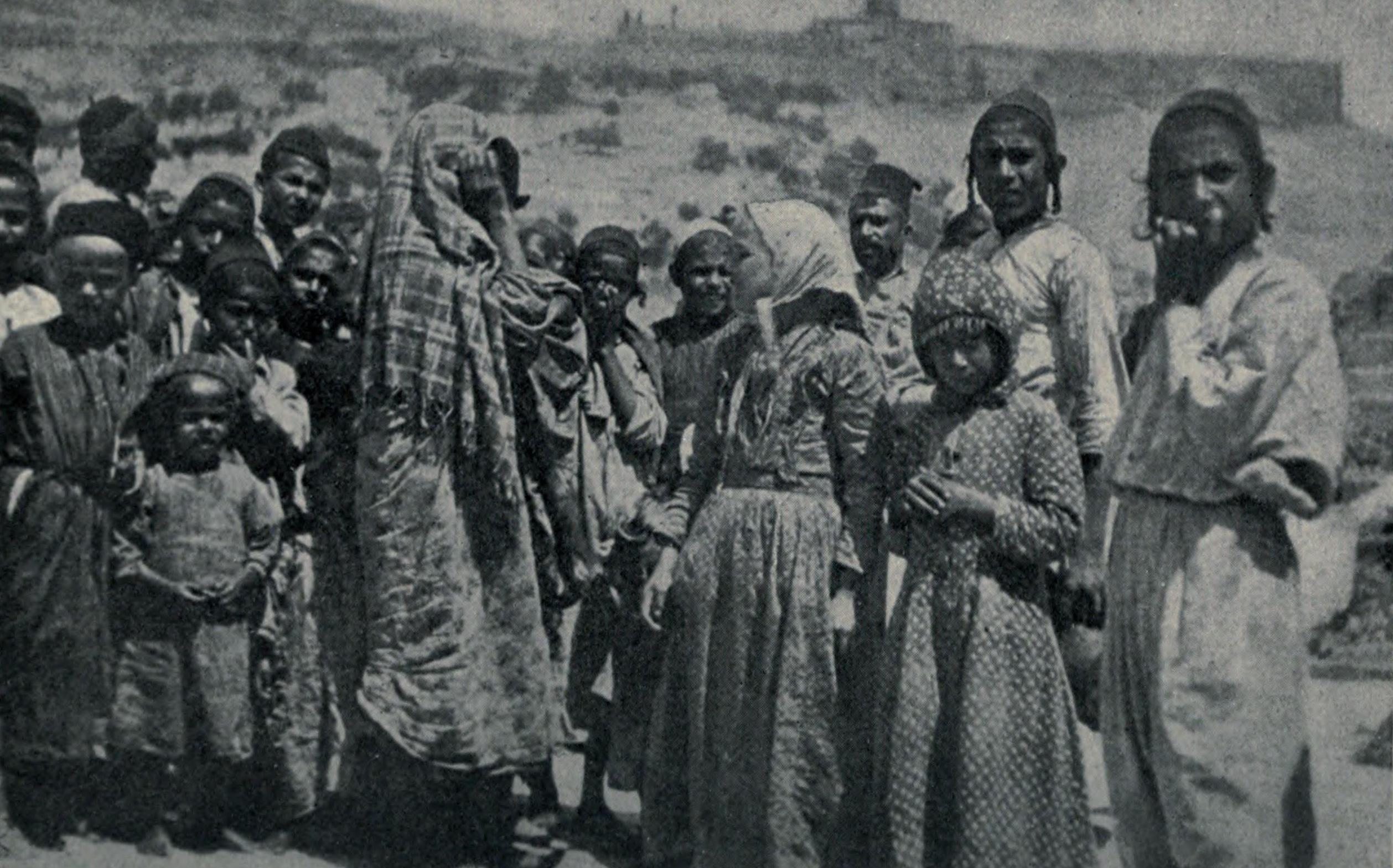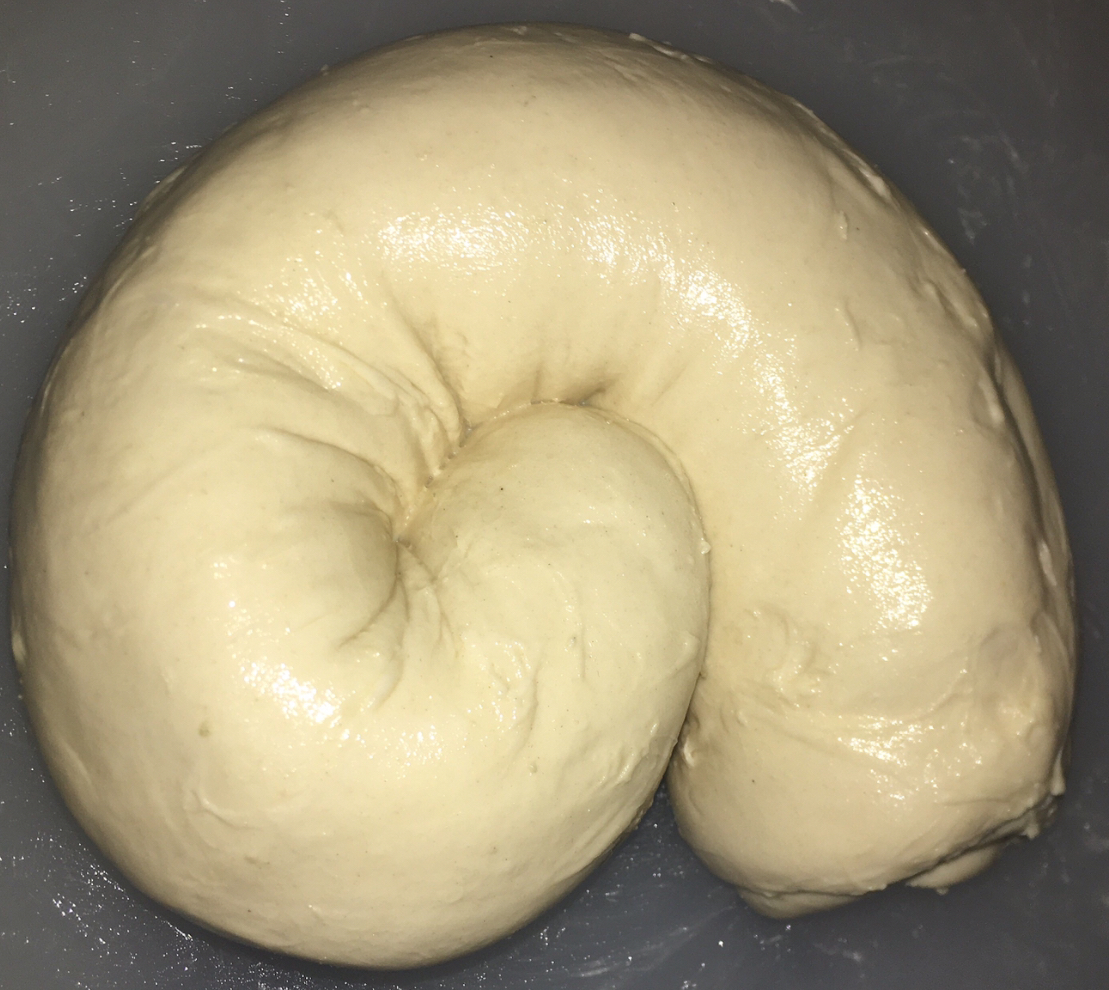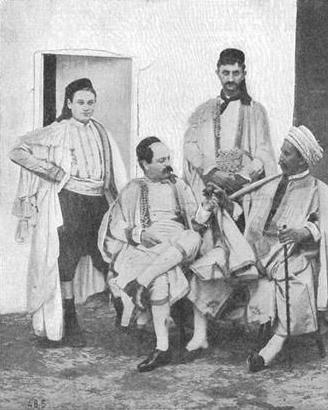|
Kubaneh
Kubaneh ( he, כֻּבַּאנֶה) is a traditional Yemenite Jewish bread that is popular in Israel. Kubaneh is traditionally baked overnight to be served for Shabbat morning accompanied by haminados (eggs that are baked in their shells along with the bread), and resek agvaniyot (grated tomato). History A Jewish community existed in Yemen for thousands of years, until the 20th century when pogroms, persecution and discrimination forced the Jewish population to flee Yemen en masse, and to seek refuge in Israel. Only a very small community of Jews remains in Yemen today. Yemenite Jews traditionally made their kubaneh from either sorghum flour or cornmeal during the regular weekdays, but used wheat flour on Sabbath days and holidays. Some would add to the dough either sugar, honey or black cumin. Baking was done in a greased pot, tightly sealed, and left to cook overnight. The kubāneh was eaten the following day while it was still hot, and many of the diners have been known to as ... [...More Info...] [...Related Items...] OR: [Wikipedia] [Google] [Baidu] |
Israeli Cuisine
Israeli cuisine ( he, המטבח הישראלי ) comprises both local dishes and dishes brought to Israel by Jews from the Diaspora. Since before the establishment of the Israel, State of Israel in 1948, and particularly since the late 1970s, an Israeli Jewish fusion cuisine has developed.Gold, Rozann''A Region's Tastes Commingle in Israel'' (July 20, 1994) in ''The New York Times'' Retrieved 2010–02–14 Israeli cuisine has adopted, and continues to adapt, elements of various styles of Arab cuisine and diaspora Jewish cuisine, particularly the Cuisine of the Mizrahi Jews, Mizrahi, Cuisine of the Sephardic Jews, Sephardic and Ashkenazi_Jewish_cuisine, Ashkenazi styles of cooking. It incorporates many foods traditionally included in other Middle Eastern cuisine, Middle Eastern and Mediterranean cuisines, so that spices like ''za'atar'' and foods such as ''falafel'', ''hummus'', ''msabbha'', ''shakshouka'' and ''couscous'' are now widely popular in Israel.Gur, ''The Book of New ... [...More Info...] [...Related Items...] OR: [Wikipedia] [Google] [Baidu] |
Yemenite Jews
Yemenite Jews or Yemeni Jews or Teimanim (from ''Yehudei Teman''; ar, اليهود اليمنيون) are those Jews who live, or once lived, in Yemen, and their descendants maintaining their customs. Between June 1949 and September 1950, the overwhelming majority of Yemen's Jewish population immigrated to Israel in Operation Magic Carpet. After several waves of persecution throughout Yemen, the vast majority of Yemenite Jews now live in Israel, while smaller communities live in the United States and elsewhere. Only a handful remain in Yemen. The few remaining Jews experience intense, and at times violent, anti-Semitism on a daily basis. Yemenite Jews have a unique religious tradition that distinguishes them from Ashkenazi Jews, Sephardi Jews, and other Jewish groups. They have been described as "the most Jewish of all Jews" and "the ones who have preserved the Hebrew language the best". Yemenite Jews fall within the "Mizrahi" (eastern) category of Jews, though they differ ... [...More Info...] [...Related Items...] OR: [Wikipedia] [Google] [Baidu] |
Yemenite Jewish
Yemenite Jews or Yemeni Jews or Teimanim (from ''Yehudei Teman''; ar, اليهود اليمنيون) are those Jews who live, or once lived, in Yemen, and their descendants maintaining their customs. Between June 1949 and September 1950, the overwhelming majority of Yemen's Jewish population immigrated to Israel in Operation Magic Carpet. After several waves of persecution throughout Yemen, the vast majority of Yemenite Jews now live in Israel, while smaller communities live in the United States and elsewhere. Only a handful remain in Yemen. The few remaining Jews experience intense, and at times violent, anti-Semitism on a daily basis. Yemenite Jews have a unique religious tradition that distinguishes them from Ashkenazi Jews, Sephardi Jews, and other Jewish groups. They have been described as "the most Jewish of all Jews" and "the ones who have preserved the Hebrew language the best". Yemenite Jews fall within the "Mizrahi" (eastern) category of Jews, though they differ ... [...More Info...] [...Related Items...] OR: [Wikipedia] [Google] [Baidu] |
Grated Tomatoes
Resek agvaniyot, or resek (), is an Israeli condiment made of grated tomatoes that is traditionally served with malawach, jachnun, bourekas, kubaneh, and other dishes. It frequently paired with zhug, and is also commonly served as part of the Israeli breakfast. Origins Resek agvaniyot originated in the Yemenite Jewish community several hundred years ago, following the introduction of tomatoes to their cuisine, and as part of their traditional Shabbat morning meals. Overview Resek agvaniyot is a condiment made of salted, grated, fresh/raw tomatoes. It is somewhat similar to a salsa or a tomato puree, except it is never cooked and it always has a very fine, smooth consistency. Resek is a common condiment in Israel, and has been prepared by the Yemenite Jews for centuries, who traditionally pair it with zhoug and haminados (slow cooked eggs) and serve it with kubaneh, malawach, and jachnun as part of their Shabbat morning breakfast. With the arrival of Yemenite Jews to Israel ... [...More Info...] [...Related Items...] OR: [Wikipedia] [Google] [Baidu] |
Resek Agvaniyot
Resek agvaniyot, or resek (), is an Israeli condiment made of grated tomatoes that is traditionally served with malawach, jachnun, bourekas, kubaneh, and other dishes. It frequently paired with zhug, and is also commonly served as part of the Israeli breakfast. Origins Resek agvaniyot originated in the Yemenite Jewish community several hundred years ago, following the introduction of tomatoes to their cuisine, and as part of their traditional Shabbat morning meals. Overview Resek agvaniyot is a condiment made of salted, grated, fresh/raw tomatoes. It is somewhat similar to a salsa or a tomato puree, except it is never cooked and it always has a very fine, smooth consistency. Resek is a common condiment in Israel, and has been prepared by the Yemenite Jews for centuries, who traditionally pair it with zhoug and haminados (slow cooked eggs) and serve it with kubaneh, malawach, and jachnun as part of their Shabbat morning breakfast. With the arrival of Yemenite Jews to Israel ... [...More Info...] [...Related Items...] OR: [Wikipedia] [Google] [Baidu] |
Malawach
Malawach or Melawwaḥ, (; literally means "board-like bread"), is a flatbread that is traditional in Yemenite Jewish cuisine. It was brought to Israel by Yemenite Jews. Malawach resembles a thick pancake but consists of thin layers of puff pastry brushed with oil or fat and cooked flat in a frying pan. It is traditionally served with hard-boiled eggs, ''zhug'', and a crushed or grated tomato dip. Sometimes it is served with honey. History Malawach is made from the same dough as jachnun, a Yemenite Jewish Shabbat bread, and both originated as a variation of hojaldre, a Sephardic Jewish puff pastry, brought to Yemen by Jews expelled from Spain. Hojaldre later became ''"ajin"'', an enriched dough only made by the Yemenite Jews, and was not made by the non-Jewish Yemenis, according to Rabbi Gil Marks, a Jewish food historian Preparation Malawach was traditionally prepared at home by the women in the Yemenite Jewish community, and is made out of a laminated dough similar to ... [...More Info...] [...Related Items...] OR: [Wikipedia] [Google] [Baidu] |
Salt
Salt is a mineral composed primarily of sodium chloride (NaCl), a chemical compound belonging to the larger class of salts; salt in the form of a natural crystalline mineral is known as rock salt or halite. Salt is present in vast quantities in seawater. The open ocean has about of solids per liter of sea water, a salinity of 3.5%. Salt is essential for life in general, and saltiness is one of the basic human tastes. Salt is one of the oldest and most ubiquitous food seasonings, and is known to uniformly improve the taste perception of food, including otherwise unpalatable food. Salting, brining, and pickling are also ancient and important methods of food preservation. Some of the earliest evidence of salt processing dates to around 6,000 BC, when people living in the area of present-day Romania boiled spring water to extract salts; a salt-works in China dates to approximately the same period. Salt was also prized by the ancient Hebrews, Greeks, Romans, Byzantines, ... [...More Info...] [...Related Items...] OR: [Wikipedia] [Google] [Baidu] |
Yosef Qafih
Yosef Qafiḥ ( he, יוסף קאפח , ), widely known as Rabbi Yosef Kapach (27 November 1917 – 21 July 2000), was a Yemenite-Israeli authority on Jewish religious law (''halakha''), a dayan of the Supreme Rabbinical Court in Israel, and one of the foremost leaders of the Yemenite Jewish community in Israel, where he was sought after by non-Yemenites as well. He is widely known for his editions and translations of the works of Maimonides, Saadia Gaon, and other early rabbinic authorities (''Rishonim''), particularly his restoration of the Mishneh Torah from old Yemenite manuscripts and his accompanying commentary culled from close to 300 additional commentators and with original insights. He was the grandson of Rabbi Yiḥyah Qafiḥ, a prominent Yemenite leader and founder of the Dor Deah movement in Yemen. Qafih was the recipient of many awards, as well as an Honorary Doctorate from Bar-Ilan University. Biography Yosef Qafiḥ was born 27 November 1917 in Sana’a in Y ... [...More Info...] [...Related Items...] OR: [Wikipedia] [Google] [Baidu] |
Jachnun
Jachnun or Jahnun ( he, גַ'חְנוּן, , ) is a Yemenite Jewish pastry, originating from the Adeni Jews, and traditionally served on ''Shabbat'' morning. Yemenite Jewish immigrants have popularized the dish in Israel. Preparation Jahnun is prepared from dough which is rolled out thinly and brushed with (traditionally) ''Samneh'', which is clarified butter spiced with 'Hilbe' (fenugreek) and aged in a smoked vessel, traditionally using smoke from the wood of a specific tree, the tree (presumably ''Dodonaea viscosa'', ''sheth'' in Arabic), though regular clarified butter or shortening can be used. A little honey is sometimes added in addition, whereupon the dough is rolled up into rolls before cooking. It is traditionally cooked overnight on a 'Shabbat hotplate' at a very low temperature, starting the cooking process on the Friday (usually in the morning), to be taken out and eaten on Shabbat (Saturday) morning, as it is forbidden by Jewish custom to start cooking or turn ele ... [...More Info...] [...Related Items...] OR: [Wikipedia] [Google] [Baidu] |
Tunisian Jewish
The history of the Jews in Tunisia extended nearly two thousand years and goes back to the Punic era. The Jewish community in Tunisia is no doubt older and grew up following successive waves of immigration and proselytism before its development was hampered by anti-Jewish measures in the Byzantine Empire. The community formerly used its own dialect of Arabic. After the Muslim conquest of Tunisia, Tunisian Judaism went through periods of relative freedom or even cultural apogee to times of more marked discrimination. The arrival of Jews expelled from the Iberian peninsula, often through Livorno, greatly altered the country. Its economic, social and cultural situation has improved markedly with the advent of the French protectorate before being compromised during the Second World War, with the occupation of the country by the Axis. The creation of Israel in 1948 provoked a widespread anti-Zionist reaction in the Arab world, to which was added nationalist agitation, nationali ... [...More Info...] [...Related Items...] OR: [Wikipedia] [Google] [Baidu] |
Aviv Alush
Avraham Aviv Alush ( he, אברהם אביב אלוש; born ) is an Israeli actor, musician, model, and television host. best known as Amos Dahari "The Baker" in the Israeli series ''Beauty and the Baker'', and as Jesus in the American film '' The Shack'' (2017). He also played a leading role in the Israeli series ''Valley of Tears'' (2020). Early life Alush was born in Kiryat Bialik, Israel, to a family of both Sephardic Jewish ( Tunisian-Jewish) and Mizrahi Jewish ( Yemenite-Jewish) descent. He grew up in Karmiel, Israel, with his younger sister Reut Alush, who is also an actress. Alush was enlisted as an Infantry combat soldier in the Golani Brigade of the Israeli Defence Forces, where he served from 2000 to 2003. Career Acting In 2012 he was cast as a series regular in the Ran Danker-starring psychological series, ''The Gordin Cell''. In 2013 he began appearing in ''Beauty and the Baker'' alongside Rotem Sela. In Israel the series was positively reviewed by ''Haaretz'' new ... [...More Info...] [...Related Items...] OR: [Wikipedia] [Google] [Baidu] |
Beauty And The Baker
''The Beauty and the Baker'' () is an Israeli romantic-comedy TV series that follows the love story between a simple baker and an international supermodel. It ranks as one of the highest-rated scripted series ever in Israel.‘Baker And The Beauty’ Romantic Comedy Based On Israeli Format Set At ABC From Dean Georgaris, David Frankel & Keshet Deadline. 18 October 2018 The second season premiered on May 9, 2017. The series takes a comical approach to |








